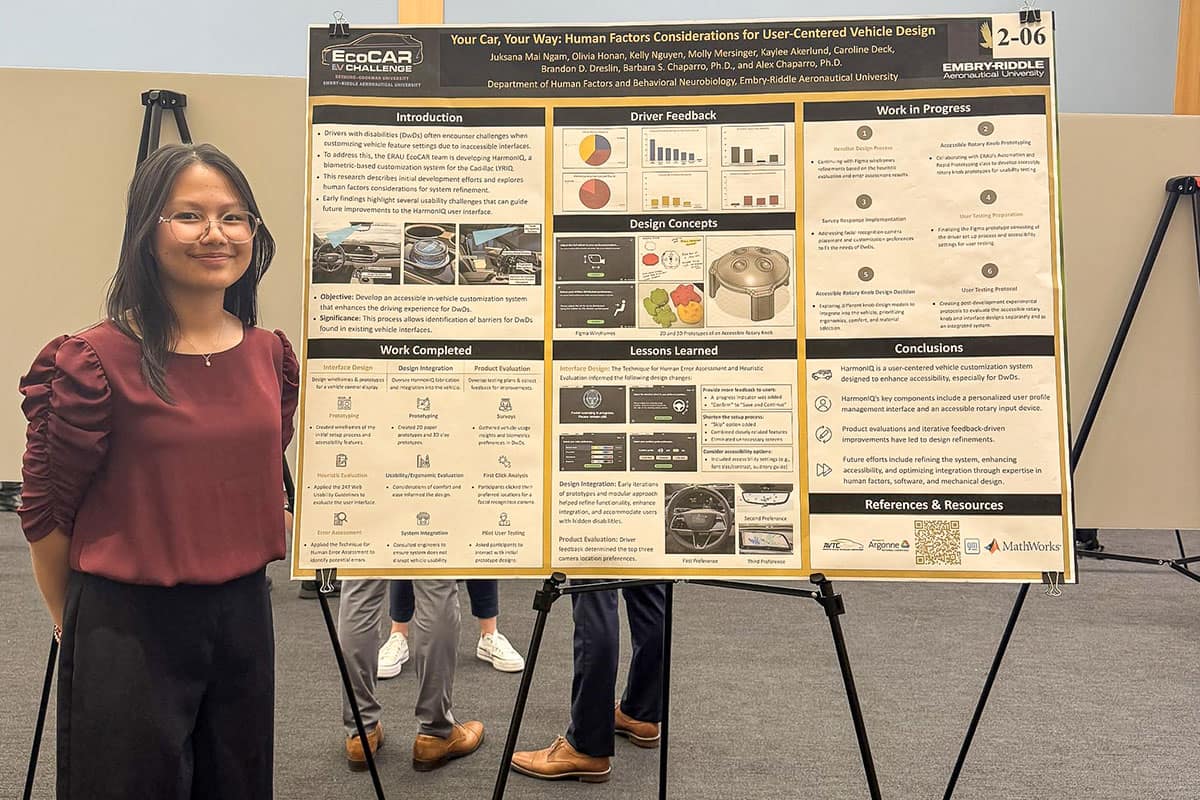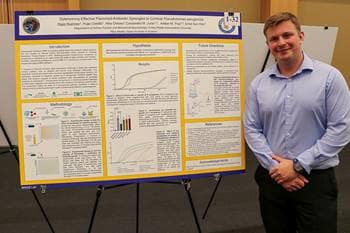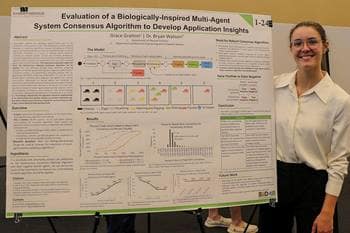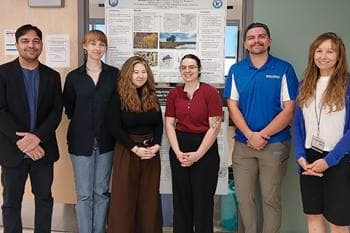A Record Year for Student Research Projects Showcased at Annual Embry-Riddle Symposiums

During April symposiums, Embry-Riddle Aeronautical University students across all three campuses presented a record number of research projects.
Their investigations spanned a range of topics, including the effects of space on bacteria, biometric-based vehicle customizations, trust in AI, secure luggage systems technology and techniques to map biodiversity using DNA.
At the Discovery Day 2025 Student Research Symposium on the Daytona Beach, Florida, campus, a record 211 research projects were presented by 535 undergraduate and graduate students, including seven Worldwide Campus students.
“Undergraduate research is the secret to success,” said Dr. Mihhail Berezovski, director of the Office of Undergraduate Research (OUR) and associate professor of Mathematics. “It gives students the chance to apply the theory they are learning in class to real life.”
More than 50 innovative student-led research projects were featured at the Undergraduate Research Institute’s Discovery Day symposium on the Prescott, Arizona, campus. The event highlighted the creativity of undergraduate researchers across all four campus colleges, with projects featuring innovations in aviation, engineering, cybersecurity, space physics, video game design and forensic studies.
“This year’s presentations truly reflect the breadth and depth of our students’ research,” said Dr. Anne Boettcher, assistant dean of Research. “Our students demonstrate the problem-solving needed to thrive in their careers.”
Daytona Beach Campus Projects

Aerospace Physiology student Yegor Bushnev was one of two winners in the Best Undergraduate Poster competition. His research looks at fighting bacteria on Earth and in space (Photo: Embry Riddle/Office of Undergraduate Research)
At Daytona Beach’s Discovery Day 2025, Aerospace Physiology student Yegor Bushnev and Space Physics student Grace Gratton tied for first place in the Best Undergraduate Poster competition.
Bushnev’s research looks at fighting bacteria on Earth and in space. The investigation uses flavonoid-antibiotic combinations on the bacteria Pseudomonas aeruginosa in both Earth and simulated microgravity conditions. Previous studies have shown bacteria exposed to space conditions demonstrate an increased resistance to antibiotics. Bushnev’s faculty mentor on the project is Dr. Emel Sen-Kilic, assistant professor of Aerospace Physiology in the Department of Human Factors and Behavioral Neurobiology.
Gratton’s project involves developing of a consensus algorithm for multi-agent systems inspired by the synchronous hatching of turtles. The research can be applied to managing drone swarms or satellites. Gratton is a research assistant for the Biologically Inspired Design for Resilience Lab (BID4R), and her faculty mentor is Dr. Bryan Watson, assistant professor in the Department of Electrical Engineering and Computer Science. Gratton received Office of Undergraduate Research support to present her research at the Conference on Systems Engineering Research (CSER) in Los Angeles, California, in March.
“It is really exciting to know that people are noticing your, work,” Gratton said.

Space Physics student Grace Gratton tied for the Best Undergraduate Poster for her research on developing an algorithm for multi-agent systems inspired by the synchronous hatching of turtles. (Photo: Embry-Riddle/Office of Undergraduate Research)
Juksana Mai Ngam, who is pursuing her M.S. in Human Factors, took the top spot in the Best Graduate Research Poster competition. Mai Ngam's project highlighted the Embry-Riddle EcoCAR Human-Machine Interface (HMI) team’s development of HarmonIQ, a biometric-based vehicle customization system to enhance accessibility, especially for drivers with disabilities. Her faculty mentors are Dr. Barbara Chaparro, professor and program coordinator for Ph.D. in Human Factors, and Dr. Alex Chaparro, professor and director of the Applied Perception and Performance Lab. Her team members include Brandon Dreslin, Caroline Deck, MollyMersinger, Olivia Honan, Kelly Nguyen and Kaylee Akerlund, as well as other EcoCAR HMI team members who contributed to the research.
Additionally, Aerospace Physiology student Riley Dienna was chosen as Undergraduate Researcher of the Year. Working in the Omics Lab for Health and Human Performance, Dienna has designed a research project in which human monocyte cells will be genetically engineered to fight fungal pathogens more effectively. Dienna also received Office of Undergraduate Research support to present her research in April at the American Physiological Society Summit in Baltimore, Maryland.
“I’m just really excited to have the opportunity to continue my current project,” Dienna said.
Trevor Simoneau was chosen as Graduate Researcher of the Year. Earning his M.S. in Aviation, he is a graduate research assistant at the Boeing Center for Aviation and Aerospace Safety (BCAAS).
Dr. Alba Chavez, assistant professor of Human Factors and Behavioral Neurobiology, was selected as Faculty Mentor of the Year for maintaining a strong track record of student research success.
A record number of students also received funding to continue their research. Thirty-one Summer Undergraduate Research Fellows (SURF) grants were awarded, about double the number awarded in previous years. This year, SURF award sponsors included the colleges of Aviation, Arts & Sciences and Engineering, along with the Honors Program and the Center for Aerospace Resilient Systems (CARS). SURF fellows receive a stipend and additional funding to support their research over the summer.
Six Student Internal Grants (SIG), which help fund longer-term research projects, were funded from 29 applications. Plus, 10 Ignite grants, designed for undergraduate-led groups conducting long-term research projects, were funded from 27 submissions.
Among the recipients, Dienna was awarded a College of Arts and Sciences SURF fellowship for this summer and an Ignite grant for the next academic year for her research, while Bushnev received an Ignite grant. Chavez is a faculty mentor for a funded SIG grant and another College of Arts and Sciences SURF fellow.
Prescott Campus Projects
Prescott’s Discovery Day symposium featured research projects focused on everything from artificial intelligence to cybersecurity and biodiversity. Projects were funded through internal grants, as well as philanthropic support and industry partnerships.
The breadth of projects and scope of funding are evidence of Embry-Riddle’s commitment to producing research-ready graduates prepared to lead across science, technology, engineering and mathematics (STEM) fields, said Dr. Kenneth Witcher, chancellor of the Prescott Campus.
“What we saw today is proof that our undergraduates are more than just students — they are innovators who will fuel future industries,” he said.
Emanuele Bossi, a Software Engineering and Data Science student, and Francesco Busini, who is majoring in Mechanical Engineering, designed experiments to evaluate how transparency, user control and AI error rates influence human trust in AI-driven decision systems. Now, the pair is expanding their research by incorporating flight simulators to gather deeper insights into how trust is formed during interactions with AI in high-stakes environments.
Under the guidance of faculty mentors Stacey McIntire, assistant professor and department chair of Aeronautical Science, and Timothy King, associate professor in the Electrical, Computer and Software Engineering Department, the project offers valuable takeaways for engineers and designers aiming to build AI tools that support human performance. The research earned the College of Business, Security and Intelligence (CBSI) Philanthropy Council Award. Bossi and Busini also presented their findings at the Arizona Space Grant Symposium in April in Tucson, Arizona.
“We’re currently designing a study in which participants interact with AI agents operating under varying levels of explainability and accuracy,” Bossi explained.
Meanwhile, Software Engineering student Owen Guerra-Mondragon Saenz teamed up with Cyber Intelligence and Security undergraduates Aaron Tulino, Benjamin Higgins, Philipp Shchetinin and Sawyer Hansen to develop a secure luggage tracking system.

At the Discovery Day symposium on the Prescott Campus, a team of biology students present their research mapping biodiversity as part of the Del Rio Springs State Park Restoration Project. (Photo: Embry-Riddle/Office of Undergraduate Research)
The system uses Radio Frequency Identification (RFID)-based Internet of Things (IoT) technology and was built on a full-scale testbed to replicate airport conditions and identify potential vulnerabilities. With funding from both IGNITE and the Arizona Space Grant Program, the project offers actionable strategies to make airport systems more secure.
Faculty mentors on the project are Dr. Catalina Aranzazu-Suescun, assistant professor in the Cyber Intelligence and Security Department, and Dr. Luis Felipe Zapata-Rivera, assistant professor in the Electrical, Computer and Software Engineering Department.
A team of Embry-Riddle biology students embarked on a Del Rio Springs State Park Restoration Project to map the Arizona region's biodiversity using cutting-edge and traditional field research methods.
A comprehensive environmental survey of the area was undertaken by Forensic Biology students Alea Lind, Carson Westman and Tatiana Gomez, as well as students Amanda Dulaney and Lily Stein, who are majoring in Applied Biology.
Their approach combined hands-on evaluation with environmental DNA (eDNA) metabarcoding — an advanced genomic tool that detects species from trace DNA left behind in soil and water.
“Sampling across four sites, we identified 31 invasive plant species such as Poison Hemlock and Broom Snakeweed,” Stein said.
The investigation was awarded an IGNITE grant, as well as the American Chemical Society (ACS) Poster Award. The team was led by faculty mentors Dr. Hillary Eaton, associate professor of Biology and chair of the Biology and Chemistry Department, and Dr. Vikram Narayan, assistant professor in the Biology and Chemistry Department.